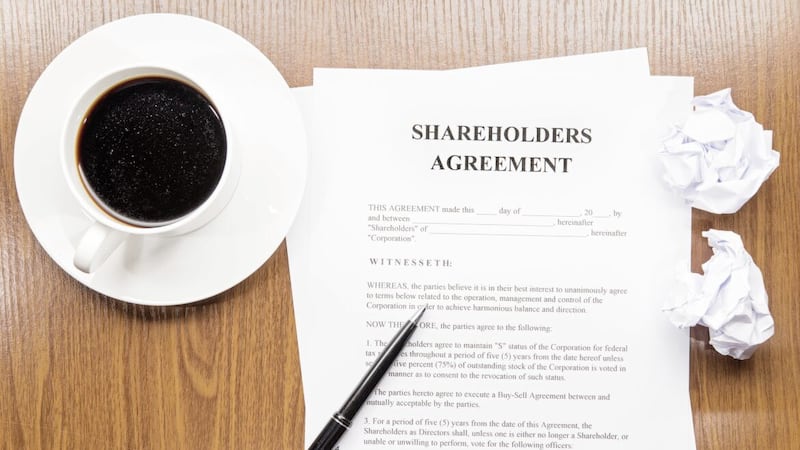A SHAREHOLDERS’ Agreement is a private contract between the shareholders of a company that can only be amended unanimously. Along with the company’s Articles of Association, it regulates the relationship between the shareholders and sets out their respective rights and obligations.
The ideal time for a company to put in place a Shareholders’ Agreement is when everyone involved is enthusiastic about their new venture. A solicitor with experience in this area will be able to explain what could go wrong and assist you in putting in place a Shareholders’ Agreement that anticipates potential problems. A well-drafted Shareholders’ Agreement will set out the road map for how those issues are to be dealt with – this will prevent matters escalating and avoid the shareholders being distracted from the goal of making their business a success.
The key issues that will be dealt with in a well-drafted Shareholders’ Agreement will include the following:-
Shareholder rights
• The voting rights that attach to the shares.
• The dividend rights of the shareholders and the company’s dividend policy.
Protection of minority shareholders
• As voting will otherwise be on a simple majority of shares held, it may be appropriate to build in protection for minorities.
• Significant decisions of the company can be made subject to the unanimous consent of the shareholders.
• Where there are to be new investors in the company, it may be appropriate to allow each existing shareholder to purchase further shares in the company to maintain their percentage shareholding (“pre-emption rights”).
Directors
• It may be appropriate for each of the major shareholders in the company to have the right to appoint a director to the board.
• Consideration should be given to which issues are to be delegated to the board and which are to be decided upon by the shareholders.
Exiting the business
• A right of first refusal can be included for continuing shareholders where a shareholder is proposing to sell their shares.
• “Good leaver” and “bad leaver” provisions can be included where a shareholder receives a different valuation for their shares depending on the circumstances of their departure.
• Restrictive covenants can be included to prevent departing shareholders competing with the business.
• Where a sale of the whole of the company is contemplated, it should be considered whether minority shareholders should be compelled to sell their shares on the same terms as the majority (“drag-along rights”) or should have the right to be purchased on the same terms (“tag-along rights”).
Disputes
• The dispute mechanism should be clearly set out.
• It may be appropriate to consider appointing an accountant to determine valuation issues and an arbitrator for other disputes.
There is no requirement for a company to have a Shareholders’ Agreement. But it is clearly too late for the shareholders to attempt to negotiate this document at the time when a dispute has arisen on any of the issues identified above.
A good solicitor will take the time to understand your business and will draw on their experience to identify potential pitfalls and include provisions in the Shareholders’ Agreement that are designed to address these. In conjunction with the Articles of Association of the company, a well drafted Shareholders’ Agreement will also reduce the likelihood of disputes when the shareholders understand their rights and obligations from the outset.
:: Julie Leeburn (julie.leeburn@mckees-law.com) is a senior associate in the corporate/commercial team at McKees (www.mckees-law.com)



